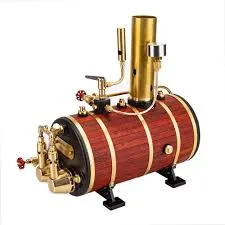
Nov . 14, 2024 08:32 Back to list
what is hot water boiler
What is a Hot Water Boiler?
A hot water boiler is a vital component in many residential, commercial, and industrial heating systems. It is designed to heat water for various purposes, such as space heating, domestic hot water supply, and even certain industrial processes. Understanding the function, types, and benefits of hot water boilers is essential for making informed decisions regarding heating systems for homes and businesses.
How Hot Water Boilers Work
Hot water boilers operate by converting fuel into heat through combustion. This heat is then transferred to water circulating in the boiler system. The heated water can be delivered through radiators, underfloor heating, or hot water taps—providing efficient heating to a building or hot water on demand. The process is generally controlled by a thermostat, which maintains the desired temperature, ensuring comfort and efficiency.
Types of Hot Water Boilers
There are several types of hot water boilers available, tailored for different applications
1. Fire-Tube Boilers In these boilers, hot gases from combustion pass through tubes, heating water outside the tubes. They are known for their durability and reliability and are commonly used in commercial settings.
2. Water-Tube Boilers These have water-filled tubes exposed to hot gases. They are typically more efficient than fire-tube boilers and can produce steam or hot water, making them versatile for various applications.
3. Electric Boilers These operate using electricity to heat water and are often used in residential applications due to their simplicity and ease of installation.
4. Condensing Boilers These utilize advanced technology to capture and reuse exhaust heat, which enhances efficiency and reduces energy consumption. They are popular in energy-conscious applications.
what is hot water boiler

Benefits of Hot Water Boilers
Hot water boilers offer numerous advantages that make them a preferred choice for heating solutions
- Efficiency Modern boilers are designed to be highly efficient, often converting over 90% of fuel energy into usable heat. This reduces energy costs and environmental impact.
- Reliability Boilers are known for their ability to provide consistent heat, making them ideal for larger buildings or colder climates where reliable heating is a necessity.
- Versatility Hot water boilers can serve multiple purposes, including heating space, providing hot water for baths and showers, and even powering appliances in industrial settings.
- Space Saving Many boiler designs are compact and can be installed in small spaces, making them suitable for a variety of environments.
- Safety Modern boilers come equipped with safety features that minimize the risks associated with heating systems, such as automatic shut-offs and pressure relief valves.
Conclusion
In summary, a hot water boiler is an integral part of many heating systems, providing efficient and reliable hot water and heating solutions for various applications. With various types available, homeowners and businesses can select a boiler that meets their specific needs and preferences. As technology advances, the efficiency and performance of hot water boilers continue to improve, making them a sustainable choice for heating in the modern world. Understanding how these systems work and the benefits they provide can lead to more informed decisions about heating solutions.
-
Best Steam Boiler Design PDF Free Design Calculation & Diagram Downloads
NewsJun.10,2025
-
Hot Boiler Water Heater Efficient Heating Solutions for Home & Commercial Use
NewsJun.10,2025
-
Steam Boiler Safety Devices High-Quality Protection Valves
NewsJun.10,2025
-
Ultimate Steam Boiler Checklist for Safety & Efficiency
NewsJun.10,2025
-
Optimal Hot Water Boiler Temperature Setting Guide
NewsJun.10,2025
-
Effective Hot Water Boiler Chemical Treatment Protect & Maintain
NewsJun.09,2025
Related PRODUCTS






















